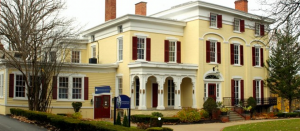The Alexander Hamilton Institute for the Study of Western Civilization (AHI) is pleased to offer two courses for the spring semester. Due to our classes’ popularity, advance signup directly with the individual course instructor is strongly recommended. Like all AHI courses, they are brought to you free of charge.
Course #1. “The Civil War”
AHI Resident Fellow Dr. David Frisk will offer a class on the Civil War—with special emphasis on its governmental and political aspects in the North and South, plus attention to its great military campaigns. A reading group focused mainly on one book, the class will meet weekly by Zoom on Wednesday evenings from February 1 through May 3, 2023 from 7:00 p.m. to 8:30 p.m. Eastern time.
Signup/Contact: dfrisk@theahi.org or 202-999-5751, or AHI President Robert Paquette at bob@theahi.org
We will read 25 to 30 pages per week. Often a reading from another scholar, or a leader of the time such as Abraham Lincoln, will be provided as an optional supplement. The first week will cover the years just before the Civil War. Class sessions begin with a brief informal lecture, then move to questions and discussion. We take a five-minute break near the midpoint.
Dr. Frisk, a resident fellow at AHI since 2013, holds a Ph.D. in political science from Claremont Graduate University. He has taught one or more classes each semester on a wide range of topics in history, political science, and political philosophy.
Our book will be Battle Cry of Freedom, an intensively researched major work by the prominent historian James McPherson. Although the book for this reading group is history, much in the Civil War also relates to political philosophy. Participants are asked to purchase the book. If need be, the AHI will purchase it for you.
From its Amazon page:
“Filled with fresh interpretations and information, puncturing old myths and challenging new ones, Battle Cry of Freedom will unquestionably become the standard one-volume history of the Civil War.”
As an example of the crucial role of political and governmental events during the war, McPherson writes in his preface:
“ … the simultaneous Confederate invasions of Maryland and Kentucky in the late summer of 1862 occurred in the context of intense diplomatic activity leading toward possible European intervention in the war, of Lincoln’s decision to issue an emancipation proclamation … and of hopes by Peace Democrats to capture control of the Union Congress in the fall elections. Each of these events directly affected the others; none can be understood apart from the whole.”
On the extraordinary quality of the war, McPherson relates:
“‘These are fearfully critical, anxious days, in which the destinies of the continent for centuries will be decided,’ wrote one contemporary in a sentence typical of countless others that occur in Civil War diaries and letters … The conflict ‘crowded into a few years the emotions of a lifetime,’ wrote a Northern civilian in 1865 … From faraway London, where he served … at the American legation, young Henry Adams wondered ‘whether any of us will be ever able to live contented in times of peace and laziness. Our generation has been stirred up from its lowest layers, and there is that in its history which will stamp every member of it until we are all in our graves. We cannot be commonplace.’”
And as Lincoln wrote in his Annual Message to Congress in the war’s second year: “Fellow-citizens, we cannot escape history. We of this Congress and this administration, will be remembered in spite of ourselves. No personal significance, or insignificance, can spare one or another of us. The fiery trial through which we pass, will light us down, in honor or dishonor, to the latest generation.”
Course #2. “Anthony Trollope: One of England’s Most Famous Novelists”
Lauren Weiner will direct a course “Anthony Trollope: One of England’s Most Famous Novelists.” The course will dip into Trollope’s so-called Palliser series to read and discuss Phineas Finn (1869), the story of a winsome young Irishman who yearns to enter Parliament. The group will meet for 12 sessions via Zoom on Monday evenings, from 7:00 p.m. to 8:00 p.m. Eastern time. The course will begin on February 13 and end on May 8, 2023.
Sign up/Contact: Lauren Weiner lweiner6@gmail.com or AHI President Robert Paquette bob@theahi.org
Feel free to use the version of Phineas Finn that you prefer. If you buy the Oxford World’s Classics paperback edition, the cost will be $11.95 on Amazon. Discussants will be reimbursed at the end of the semester for the Oxford World’s Classics paperback edition.
Lauren Weiner’s writing life has taken her to jobs as an editor, reporter, Capitol Hill staffer, and Pentagon speechwriter. She has written literary reviews as well, and these have appeared in such publications as the Wall Street Journal, Commentary, theFederalist.com, the Weekly Standard, AmericanPurpose.com, the New Criterion, the Washington Times, and the Baltimore Sun.
Why read the political novels of Anthony Trollope (1815-1882)? Trollope’s not relevant to modern Americans, right? Well, consider these features of the rich panorama created by one of Victorian England’s greatest novelists:
- A society riven by class tensions and religious schisms that struggles to keep its institutions of self-government on track.
- Self-styled reformers who range from the craven to the opportunistic to the demagogic.
- Conflict over voting rights and the expansion of suffrage.
- A creaky election system managed by dodgy campaign operatives who lead candidates—at any rate, those who are not independently wealthy—by the nose.
- “Safe” districts where there’s little genuine political competition.
- Ideologically biased journalists who throw their weight around, threatening to expose the sexual peccadilloes of politicians they don’t like.
It’s all there—plus speeches in the House of Commons, a duel, several romances, country house weekends with the aristocracy, and drinks at the Willingford Bull after a day spent riding to hounds on a horse named Bonebreaker.


Leave A Comment